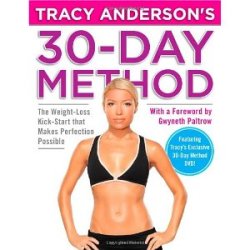 When I read what was being said about the new Tracy Anderson’s 30-Day Method: the Weight-Loss Kick-Start That Makes Perfection Possible, I couldn’t believe that someone would write and someone else would publish statements such as “defies genetics to tone, trim, and reshape the body”, “no chance for anything but terrific, fast results”, ” You can have a body more beautiful than you ever dreamed”, etc. I picked up the book from my local library to read it myself. I was surprised to read that she is from the Indianapolis-area, but shocked to hear, when I asked about her theories, that her reputation is not very positive in this area. Online I found that it is not only Hoosiers that are complaining and filing lawsuits. While it might not seem that naysayers and business mistakes matter to the effectiveness of Tracy’s “Method”, the irresponsible statements in this book make more sense to me after learning about her irresponsible decisions in the past.
When I read what was being said about the new Tracy Anderson’s 30-Day Method: the Weight-Loss Kick-Start That Makes Perfection Possible, I couldn’t believe that someone would write and someone else would publish statements such as “defies genetics to tone, trim, and reshape the body”, “no chance for anything but terrific, fast results”, ” You can have a body more beautiful than you ever dreamed”, etc. I picked up the book from my local library to read it myself. I was surprised to read that she is from the Indianapolis-area, but shocked to hear, when I asked about her theories, that her reputation is not very positive in this area. Online I found that it is not only Hoosiers that are complaining and filing lawsuits. While it might not seem that naysayers and business mistakes matter to the effectiveness of Tracy’s “Method”, the irresponsible statements in this book make more sense to me after learning about her irresponsible decisions in the past.
I believe all of us can make improvements in our bodies with focused intention and hard work. I have also watched a friend work out for over an hour every day and never gain an ounce (he was trying to beef up). Along with thousands of others, I watched Jillian Michaels‘ frustration trying to help Brittney Aberle lose weight on the Biggest Loser’s fifth season. There are many factors that influence how our bodies work, why we gain and lose weight. I do believe the “Tracy Anderson Method” may be effective and even a great solution for some people. I am concerned, however, that promising perfection is both false advertising and irresponsible treatment of her readers.
My first concern is the idea of perfection in itself. In this globalized world, I am surprised anyone would consider any single standard the only goal towards which to strive. Such ideas have contributed to the insecurities and eating disorders of too many young women. Shouldn’t we be focused on our individual progress and beauty rather than some standard of perfection?
My second concern is the expectation set up with such promises. While she is not saying that it will be easy, she is saying anyone can have terrific, fast results regardless of any other factors. I have a hard time believing that any number of medical or pharmaceutical situations do not matter at all when following her system. This book is a 30 day kick-start, yet it seems to be presented as a 30 day solution to any perceived imperfection. Setting such high expectations increases the likelihood of disappointment and giving up for those who do not feel they achieved the promised perfection as quickly as guaranteed.
The phrase “if it sounds too good to be true…” came to mind as I read this book, yet her repetitive promises did lead me to search for before and after photos of her clients, readers, or research participants. Although there are paparazzi shots of her with Madonna or Gwyneth Paltrow, I could not find any other photos or any before and after shots.
When I go to the farmer’s market, the vendors do not have large signs or shout out their promises as I pass; instead, nearly every stand offers a free sample, knowing that their quality speaks for itself. There is a new restaurant in Indianapolis that I know is good because I have heard from several satisfied customers. There is no need for them to tell me how wonderful they are or how much I will enjoy dining there. The reviews of their customers mean so much more. My fear is that Tracy Anderson is making bold statements to sell books, without concern for the mental health of her readers. Even if her claims are accurate, I would not want to work with someone who believes in a single standard of beauty or sets me up for disappointment.
